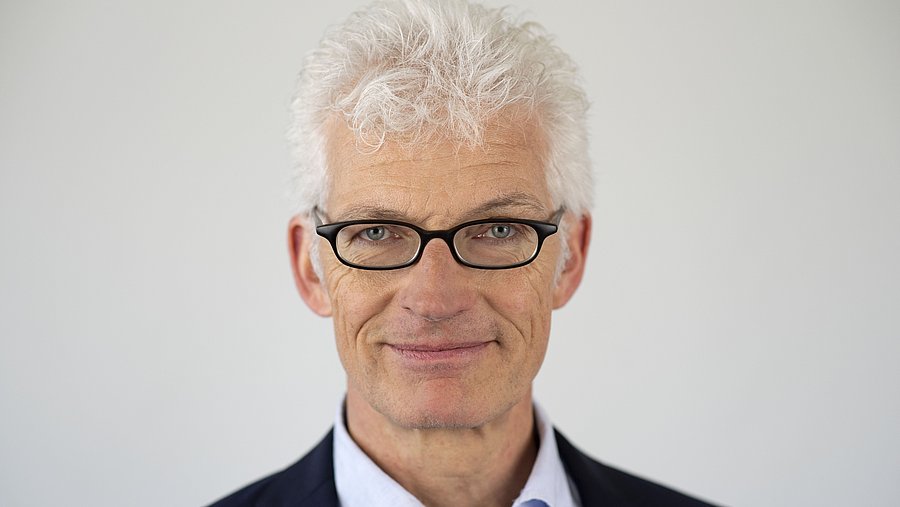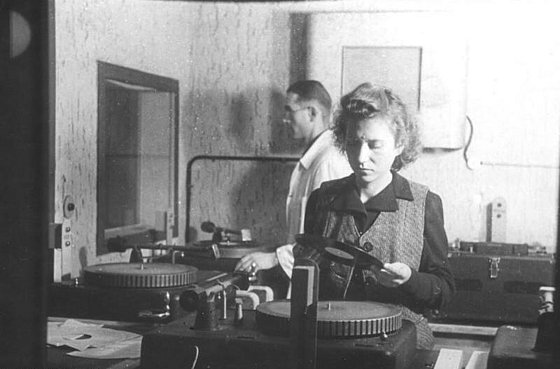
First German radio play
Prof Dr Wolfgang Lukas / German Studies
Photo: Friederike von Heyden
The attempt at a radio grotesque
Wolfgang Lukas on the first German radio play "Zauberei auf dem Sender"
The first European radio play was broadcast by the BBC on 15 January 1924. The first known German radio play went over the airwaves on 24 October 1924 under the title "Zauberei auf dem Sender". What was it about?
Lukas : In Zauberei auf dem Sender by Hans Flesch, disturbances were staged on the radio, i.e. people came in seemingly by chance, a fairy tale aunt wanted to tell a fairy tale, all things that were not actually intended for the audience, that were staged on purpose as accidental. They played with the listener's uncertainty because it was never clear whether it was part of the story or came from behind the scenes. And that was the trick, the blurring of the boundary between fiction and reality. In the end, it turned out that these were all the machinations of a magician who is called Cagliostro in the play (or in the text version published in 1924 - the first radio plays were not yet recorded), with reference to the famous gambler and adventurer of the 18th century. This magician had demanded airtime to perform acoustic magic. And people laughed at him and said: "You have to see magic"! Until then, magic was only for the eyes. To prove it, he then caused these disturbances. This also leads us to the subtitle, which reads: "Attempt at a radio grotesque". This is a certain genre that also plays with a fantastic to comical reality. There is the tradition of Dadaism, which is certainly a point of reference (the artist and painter Kurt Schwitters also did things like this at the time). Then it is also interesting to see that this tendency towards fantastic reality continues. A year later, the radio play Spuk by Rolf Gunold, also one of the first radio play authors, was published, followed a year later by the same author's radio play Radiobolo, der Funkdeibel. In other words, it is ultimately about the self-thematisation of the medium, and that is the real message. The possibilities of creating acoustic illusions of reality are explored. This can be seen as analogous to very early film, which began in the same way in the 1890s with the animated films and little pieces of magic by Georges Méliès in France, where, among other things, stop-motion was used.
In the review a week later, the author asked: "But wouldn't it be possible to achieve artistic effects with the radio that neither the theatre, nor the concert, nor the cinema can achieve?" So what is special about radio plays?
Lukas: The special thing is the idea of pure acoustic illusion, i.e. the symbolic depiction of reality using acoustic means alone. I don't just have the language, but also the music and the sounds. These acoustic effects have a different status than the optical/visual. I would like to make a connection with the endeavours towards an 'immediate life' that emerged at the end of the 19th century in the context of the so-called 'ideology of life'. These are currents that permeate the entire cultural life, the arts and the sciences, so to speak, and where, based on Nietzsche's criticism of the ossified, anti-life bourgeois civilisation and culture, the slogan is issued: 'We want the immediate life! In art, this then leads to new forms of speech. For example, in Expressionism, where people turned away from a conventional conceptual-abstract language and became figurative. A little later, at the same time as the invention of the radio play, Béla Balász published his famous manifesto on silent film(Der sichtbare Mensch oder die Kultur des Films 1924), in which he wrote that the great thing about silent film was that language was not needed at all, that it could be replaced by gestures and facial expressions. In other words, the non-linguistic acoustic is once again much more immediate. In Zauberei auf dem Sender (Magic on the Radio), this can be beautifully recognised once again by a musical interlude that also appears to be unplanned. People were certainly already familiar with music from the gramophone, which they could listen to in their cosy parlour, but it was obviously something completely different via the radio, because it was independent of the situation.
One year later, 43 hours of radio plays were already scheduled, and by the 1990s the figure had risen to almost 2,800 hours. Which topics are most suitable for radio plays?
Lukas : There is certainly no absolute answer to that question, because there is actually no strict link between medium, genre and specific content. That's quite open to begin with. What is clear is that larger epic formats such as novels are certainly not suitable. As it is associated with immediacy, it is always such small snapshots. There is a significant accumulation of extreme human situations. This actually starts in literature with the interior monologue. Both monologue novellas by Arthur Schnitzler, for example, Lieutenant Gustl (1900) and Fräulein Else (1924), offer us the thoughts of characters in their last hours before death, seemingly without warning. The first British radio play Danger does something similar. Three people have had an accident in a mine and have to brace themselves for death. They are rescued in the end, but the radio play captures characters in an extreme situation and is very close. In addition, the radio play in the fiction takes place in the mine, in complete darkness, i.e. this is of course programmatic, the visuals should not play a role. The first two French radio plays from the same year, 1924, were set on a ship in distress and staged the monologue of a dying man (Paul Camille, Marémoto and Agonie). To this day, radio plays like to focus on such existential extreme situations, just think of Andreas Ammer's radio plays, which repeatedly invent such fictions(Radio Inferno 1993, Apocalypse live 1994, Crashing Aeroplanes 2001, Spacemen '85 2005).

In the control room during a radio play production (1946) CC BY-SA 3.0 de
In 1931, citizens complained to the radio station because they felt overwhelmed by three radio plays a week and sought relaxation in music. In 1938, the radio play 'War of the Worlds' based on H.G. Wells caused a real scandal and panic among the population in New York. What had happened?
Lukas : The makers of the radio play were again playing with the phenomenon of 'authenticity'. This novel by Wells from 1898 involves an attack by Martians on Earth that can only be prevented by bacteria. Orson Welles wrote a radio play adaptation with his companion and thus achieved his artistic breakthrough. The point is that the radio play, much more than the film, promises absolute authenticity. It must also be said that although people were used to radio in the 1930s, there were not only radio plays, but above all news. Radio was first and foremost the medium for the documentary. It reported on real events and then this radio play came along and caused panic.
After the Second World War, radio drama experienced another boom. Why was that?
Lukas : This boom actually continued until the advent of television. However, it wasn't until the 1960s that it became established as a new mass medium. Radio was still predominant in the 40s and 50s. However, it must also be said that radio was massively instrumentalised, especially in Germany during the Second World War. It was the propaganda tool for Joseph Göbbels, you can still see the room in the Haus des Rundfunks in Berlin where he stood in the corner and gave his inflammatory speeches. That was his instrument of power. And after the war, the experience was different.
In the 1950s, the way radio plays were made changed and people often spoke of the 'word radio play'. What did that mean?
Lukas : In a way, it was new, but from a later perspective it was actually the old radio play. It wasn't until the 60s that the new movement started. In the 50s, we had the traditional radio play, i.e. chamber plays, small theatre pieces with a strong emphasis on action, a traditional narrative and relatively little use of music and sound, i.e. a strong emphasis on words.
The biggest scandal in German radio play history occurred in 1969 with Ludwig Harig's radio play "Staatsbegräbnis oder Vier Lektionen politischer Gemeinschaftskunde". What did the author do?
Lukas : This is one of the first original sound radio plays, so to speak, and probably the most prominent expression of the so-called 'new radio play'. It sets itself apart from the old word- and action-centred radio play of the Adenauer era of the 1950s. By the end of the 1960s, the technology had also reached the point where the authors themselves could go out on the street and collect original sound recordings, meaning that there were no more pure studio productions. However, Harig only uses things that were broadcast on the radio. Paul Wühr and Paul Pörtner, who were working at the same time, took a freer approach. Here, Harig is editing the official coverage of Adenauer's funeral. We experience this funeral on the radio in his editing sequence and montage. The artistic effect is the selection and montage of the texts. He chooses scenes that point to the intertwining of politics and the church, i.e. the entire Catholic church clique in Cologne is evoked acoustically here. Cardinal Frings with his liturgical language, his chanting, is interrupted by strong cuts and contrasted with texts from a different context. The montage creates a semantic effect of reversal into the opposite. This was perceived as disrespectful by some contemporaries and there were stations that did not broadcast it. In fact, it was also a kind of swan song to an era. Paul Wühr then perfected this type of montage, using sounds he had recorded himself.
Due to its federal broadcasting structure, Germany is still the country in which the most radio plays are produced. One of the most successful is the series 'Die drei ???', which has sold over 50 million recordings. What genre of radio play do you listen to in your free time?
Lukas : I listen to the evening radio play series on Deutschlandfunk relatively regularly in my spare time. I'm currently working on the original sound radio play of the 1970s, especially Paul Wühr, a writer of experimental contemporary literature who wrote numerous radio plays and from whose partial estate (which is kept here at the university) I can show some archive pieces as part of a small exhibition at this year's anniversary radio play festival at the Berlin Academy of the Arts together with a doctoral student.
Uwe Blass
Wolfgang Lukas studied German and Romance languages and literature at the Ludwig Maximilian University in Munich, where he also gained his doctorate. He habilitated at the University of Passau. After academic stops in Kiel and Zurich, he took up the Chair of Modern German Literary History and Editorial Studies at the University of Wuppertal in 2006.
